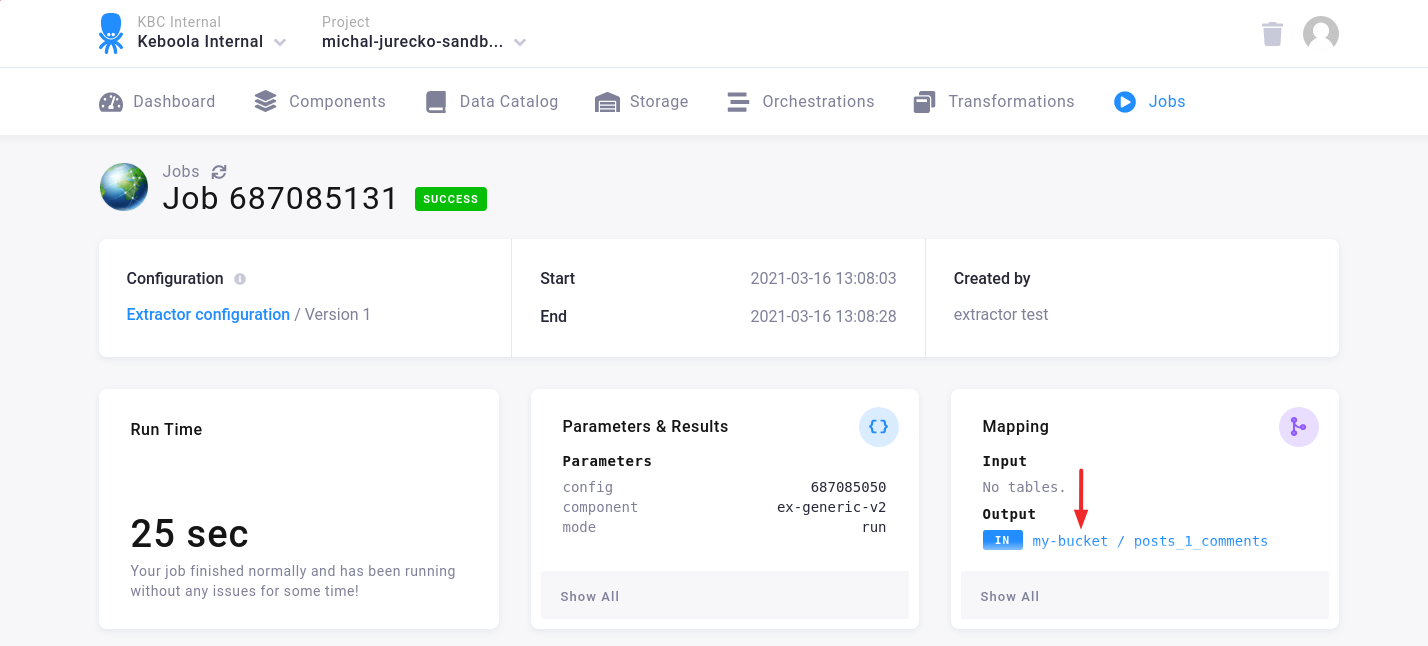Variables Tutorial
- Define API endpoints
- Obtain Storage API Token
- Define variables
- Create extractor configuration
- Run extractor configuration
- Check the job result
This tutorial will guide you through basic usage of Variables in the component configuration. The result will be the parametrized configuration of the Generic Extractor, but this approach can be applied to any component.
In the examples, we use the curl console tool to interact with our APIs.
Define API endpoints
First, store the API endpoints as environment variables, so we don’t have to repeat ourselves.
We will need:
- Storage API to store the variable definitions and the extractor configuration -
- Docker Runner API to run the extractor job from the configuration.
export STORAGE_API_HOST="https://connection.keboola.com"
export RUNNER_API_HOST="https://docker-runner.keboola.com"
Obtain Storage API Token
A Storage API Token is needed to interact with the Storage and Docker Runner APIs.
Obtain a Storage API token from the user interface of your project, see this Guide.
Then store the token to the environment variable.
export TOKEN="..."
Define variables
The next step is to define the variables in a Variable Configuration.
Define name and type of the variables.
export VARIABLE_CONFIG_NAME="Extractor variables"
export VARIABLE_CONFIG='
{
"variables": [
{
"name": "outputBucket",
"type": "string"
},
{
"name": "id",
"type": "int"
}
]
}
'
Use Create Configuration API call to store variable configuration.
curl --include \
--request POST \
--header "Content-Type: application/x-www-form-urlencoded" \
--header "X-StorageApi-Token: $TOKEN" \
--data-urlencode "name=$VARIABLE_CONFIG_NAME" \
--data-urlencode "configuration=$VARIABLE_CONFIG" \
"$STORAGE_API_HOST/v2/storage/components/keboola.variables/configs"
Example API call result.
{
"id":"1234",
"name":"Extractor variables",
"description":"..."
}
Save variable configuration id from the the result to the environment variable.
export VARIABLE_CONFIG_ID="1234"
The created variable configuration defines the names and types of variables.
You can create additional configurations that contain (default) Variable Values.
In this example, the values of the variables are entered directly to the run API call (see bellow), so configuration with the variable values is not used.
Create extractor configuration
Define extractor configuration with variables {{placeholders}}.
export COMPONENT_ID="ex-generic-v2"
export EXTRACTOR_CONFIG_NAME="Extractor configuration"
export EXTRACTOR_CONFIG='
{
"parameters": {
"api": {
"baseUrl": "https://jsonplaceholder.typicode.com/"
},
"config": {
"debug": true,
"outputBucket": "{{outputBucket}}",
"jobs": [
{
"endpoint": "posts/{{id}}/comments"
}
]
}
},
"variables_id": "'$VARIABLE_CONFIG_ID'"
}
'
Use Create Configuration API call to store extractor configuration.
curl --include \
--request POST \
--header "Content-Type: application/x-www-form-urlencoded" \
--header "X-StorageApi-Token: $TOKEN" \
--data-urlencode "name=$EXTRACTOR_CONFIG_NAME" \
--data-urlencode "configuration=$EXTRACTOR_CONFIG" \
"$STORAGE_API_HOST/v2/storage/components/$COMPONENT_ID/configs"
Example API call result.
{
"id":"4567",
"name":"Extractor configuration",
"description":"..."
}
Save extractor configuration id from the result to the environment variable.
export EXTRACTOR_CONFIG_ID="4567"
Run extractor configuration
Define values of the variables.
export VARIABLES_VALUES='
[
{"name": "outputBucket", "value": "my-bucket"},
{"name": "id", "value": 1}
]
'
In this example are values of the variables part of the run job request.
For other ways to define values see the Variables documentation.
Use Run Job API call to run extractor configuration.
curl --include \
--request POST \
--header "Content-Type: application/json" \
--header "X-StorageApi-Token: $TOKEN" \
--data-binary '
{
"config": "'$EXTRACTOR_CONFIG_ID'",
"variableValuesData": {
"values": '$VARIABLES_VALUES'
}
}
' \
"$RUNNER_API_HOST/docker/$COMPONENT_ID/run"
Check the job result
The status of a running job can be seen via API or UI.
In the picture we can see that the entered values of the variables were used.

A note about the replaced variables is in the job logs.

See the Variables documentation for more information.
